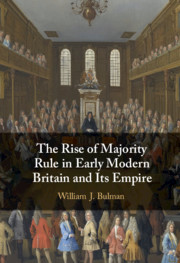Book contents
- The Rise of Majority Rule in Early Modern Britain and Its Empire
- The Rise of Majority Rule in Early Modern Britain and Its Empire
- Copyright page
- Dedication
- Contents
- Figures
- Tables
- Acknowledgments
- Note on the Text
- Abbreviations
- 1 Introduction
- 2 Consensus in the Commons, 1547–1642
- 3 Consensus Imperiled, 1640–1641
- 4 Consensus Destroyed, 1641–1643
- 5 Revolutionary Decisions, 1643–1660
- 6 The Majority Institutionalized, 1660–1800
- 7 Little Parliaments in the Atlantic Colonies, 1613–1789
- 8 Conclusion
- Bibliography
- Index
3 - Consensus Imperiled, 1640–1641
Published online by Cambridge University Press: 22 March 2021
- The Rise of Majority Rule in Early Modern Britain and Its Empire
- The Rise of Majority Rule in Early Modern Britain and Its Empire
- Copyright page
- Dedication
- Contents
- Figures
- Tables
- Acknowledgments
- Note on the Text
- Abbreviations
- 1 Introduction
- 2 Consensus in the Commons, 1547–1642
- 3 Consensus Imperiled, 1640–1641
- 4 Consensus Destroyed, 1641–1643
- 5 Revolutionary Decisions, 1643–1660
- 6 The Majority Institutionalized, 1660–1800
- 7 Little Parliaments in the Atlantic Colonies, 1613–1789
- 8 Conclusion
- Bibliography
- Index
Summary
This chapter describes and explains the early weakening of consensual decision-making in the Commons between the opening of the Short Parliament and December 1642. The political conflicts of these years were not able, in themselves, to topple the consensual tradition prevailing in Parliament, but some of them further revealed the conditions under which consensual decisions become increasingly infeasible. Divisions that did occur often involved ideological conflict, but ideological conflict was insufficient for causing majoritarian decisions. Instead, divisions in the House were overwhelmingly related to perceived threats to the honor, privilege, existence, or authority of the House of Commons, the Parliament as whole, or its members in particular. Conflicts over what course of action best conduced to maintaining the status of the House were what consistently led to divisions.
Keywords
- Type
- Chapter
- Information
- Publisher: Cambridge University PressPrint publication year: 2021

